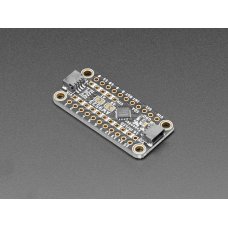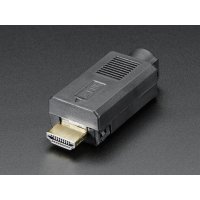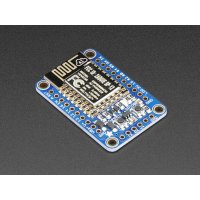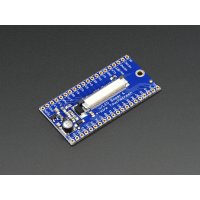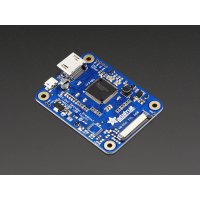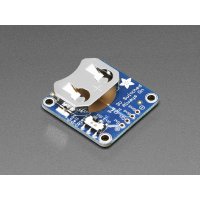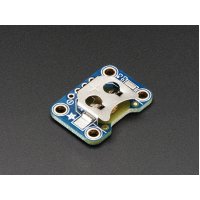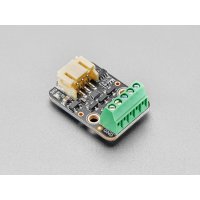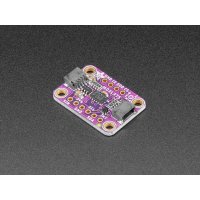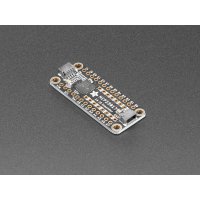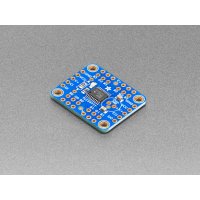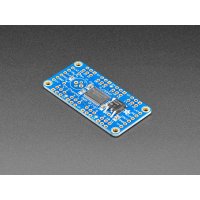Expand your project possibilities, with the Adafruit AW9523 GPIO Expander and LED Driver Breakout - a cute and powerful I2C expander with a lot of tricks up its sleeve.
GPIO expanders work like this: you have a board with some number of GPIO but not enough for your project - maybe you need more buttons or LEDs. You could upgrade to a board with massive number of GPIO like the Grand Central, or you could pop on one of these boards. Connect it over I2C and then you can send/receive I2C commands to control the GPIO pins to write and read them. It's going to be slower than direct GPIO access, but maybe that doesn't matter if it takes a millisecond instead of a microsecond. You only need the two I2C pins, and you can even share the I2C port with other sensors and devices. Heck, you can even add more expanders for massive I/O control!
- First up, its very affordable - who doesn't love that?
- It has 16 I/O pins, that'll double most boards' pin count
- Four I2C address options, so you can connect 4 expanders to one bus
- Each pin can be an input or an output
- IRQ output can alert you when input pins change value
- This chip does not support internal pull-ups or pull-downs, you will need to add an external resistor if you need one
- However, it does have 8-bit linear constant-current LED dimming support so you can connect LEDs without resistors and have great looking dimming without PWM
- The first 8 pins can be configured as open drain (as a group)
- 16 multi-function I/O, each for LED drive (current-source dimming) or GPIO mode
- 256 steps linear dimming in LED drive mode
- Any GPIO can be configured as an input or an output independently
- Support interrupt, 8us deglitch, low-level active
- Standard I2C interface, AD1/AD0 select I2C device address
- SDA, SCL, SHDN, and all GPIO can accept in 1.8V logic input
- ESD protection: ±4000V HBM (MIL-STD-883H Method 3015.8 standard)
- Latch-up :±450mA( JEDEC STANDARD NO.78C SEPTEMBER 2010 standard)
- Supply shutdown function, low-level active
- 2.5V~5.5V power supply
- I2C address default 0x58 (can be 0x59, 0x5A or 0x5B)
Documents :
Package Includes :
- 1 x Adafruit 4886 AW9523 GPIO Expander and LED Driver Breakout - STEMMA QT / Qwiic
Adafruit 4886 AW9523 GPIO Expander and LED Driver Breakout - STEMMA QT / Qwiic
- Brand: Adafruit
- Product Code: Ada-AW9523-GPIO-Expander-Breakout
- Reward Points: 6
- Availability: In Stock
-
रo 534.00
- Price in reward points: 564
-
- 45 or more रo 468.00
- 290 or more रo 466.00
Related Products
Adafruit 3118 HDMI Plug to Terminal Block Breakout
HDMI Plug to Terminal Block Breakout Make your own custom HDMI cable or HDMI interface with ease..
रo 809.00
Adafruit 2471 HUZZAH ESP8266 Breakout
Add Internet to your next project with an adorable, bite-sized WiFi microcontroller, at a price you ..
रo 1,074.00
Adafruit 1932 40-pin TFT Friend - FPC Breakout with LED Backlight Driver
This breakout board is something we designed in-house to help us work with 'dot-clock' 40-pin TFT di..
रo 1,074.00
Adafruit 2218 TFP401 HDMI/DVI Decoder to 40-Pin TTL Breakout - Without Touch
It's a mini HDMI decoder board! So small and simple, you can use this board as an all-in-one display..
रo 3,232.00
Adafruit 1870 / 1871 20mm Coin Cell Breakout
Simple but effective - this sewable breakout board has a CR2032 coin cell battery holder soldered on..
रo 270.00
Adafruit 1868 / 1867 12mm Coin Cell Breakout Board
Simple but effective - this breakout board has a CR1220 coin cell battery holder soldered on and 0.1..
रo 210.00
Adafruit 2926 Assembled Terminal Block Breakout FeatherWing
The Terminal Block Breakout FeatherWing kit is like the Golden Eagle of prototyping FeatherWings (eg..
रo 1,614.00
Adafruit 5888 NeoRGB Stemma - NeoPixel to RGB PWM LEDs and Strips - STEMMA JST PH 2mm
Whenever we're working with 'true analog' LED strips, that have 1-3 channels of RGB or White LEDs, w..
रo 534.00
Adafruit 5374 ADXL375 - High G Accelerometer (+-200g) with I2C and SPI - STEMMA QT / Qwiic
Hey rocket man (burnin' out your fuse out there alone) ever wonder how fast you're rocketing? The Ad..
रo 2,693.00
Adafruit 5346 MCP23017 I2C GPIO Expander Breakout - STEMMA QT / Qwiic
We’ve gotten a lot of requests for a MCP23017 breakout and we’ve always sorta been like “ehh why not..
रo 642.00
Adafruit 1455 12-Channel 16-bit PWM LED Driver - SPI Interface - TLC59711
For all of you out there who want to control 12 channels of PWM, we salute you! We also would like y..
रo 809.00
Adafruit 1429 24-Channel 12-bit PWM LED Driver - SPI Interface - TLC5947
For all of you out there who want to control 24 channels of PWM, we salute you! We also would like y..
रo 1,614.00
Tags: Adafruit, GPIO Expander, LED Driver, Breakout, STEMMA, QT / Qwiic

